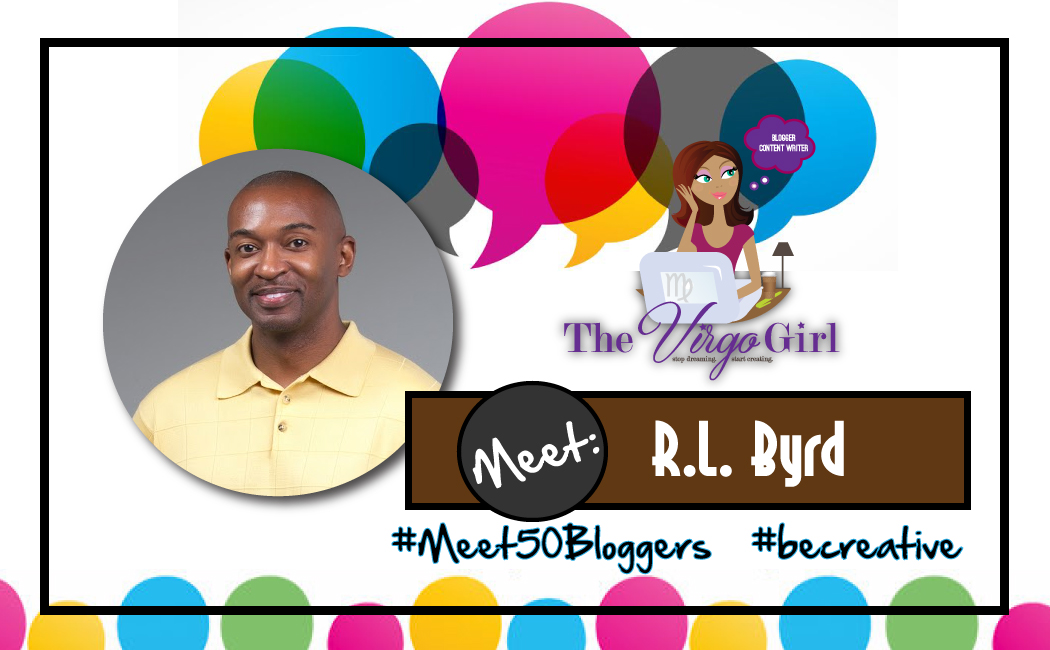R. L. Byrd is a writer and architect who currently resides in Atlanta, Georgia. Byrd’s strong advocacy for personal and social issues led him to create Project H.U.S.H. (Homicide, Unemployment, Suicide and HIV/Aids). Using social media to his advantage, Byrd continues to educate, build awareness, and shed light on the issues impacting men of color.
For a man who could be viewed as an intimidation to some—after all, he is an architect—Byrd has another side to him. He creates books that not only entertain, but inform and send a message to his readers.
“I can be whomever I want to be when I write; but most of all, I want to be the character who changes the hearts and minds of not only the people in my books, but those who read them.”—R. L.

You graduated from the University of Oklahoma in 1992 with a Bachelor of Architecture. How did you make the transition to writing your debut novel, Looking for Sweet Love, in 2010?
First and foremost, thank you for the interview; it’s a pleasure talking with The Virgo Girl. As for the transition, I was always jotting stuff down on scraps of paper or carrying stories in my head; but it wasn’t until I was doing my field residency in China and Vietnam for my MBA that I actually made the transition. Long story short, that experience opened my eyes to the world. Once back in the U. S., I heard a voice on the radio and said, “Hell! Why not?” I scheduled an appointment and went to see this psychic, Dorothea, whose first words, before I could even get myself situated, were, “Are you working on something? Something that you’ve been working on for the past ten years? . . . Boy! You’re a writer and you need to write.” That was my confirmation.
You’ve mentioned that writing gives you a place to escape, a chance to be someone you are not or do something you may not ordinarily dare to do. What character from your books do you relate to the most on a personal level?
LOL. Good one. I don’t think I relate to a particular character “the most” in any particular book. However, there’s a piece of me in every character, as most writers pull from personal experiences (or experiences around them) to create their characters or give them a sense of realism.
What goals do you hope to accomplish through writing?
I think most writers want to entertain and educate. If a reader can be entertained and get something from the read and say, “Interesting point of view,” or “That’s something to think about,” that’s the best kind of satisfaction a writer can receive.
As an African-American self-published author, what are some challenges you face?
Of course, as an African American, there are challenges you’ll have to face that others will not, whether you’re writing for a particular audience or not. As for self-publishing, it has opened doors that traditional publishing could not for writers wanting to publish their work. The upside is that you have complete control of the writing and publishing process. The downside is that you’re a one-person show and the publishing, marketing, financing, legal challenges, and every business decision is on you.
In your opinion, what do you feel is missing from the world of self-publishing and indie authors? How can we become more connected?
When I first started out, the best advice I got (and my most memorable experience) came from meeting seasoned authors Victoria Christopher Murray and RM Johnson at the Dock Bookshop in Dallas, Texas. Although we had probably a ten-minute conversation, just the industry insight and advice on what to do (and not do, per their regrets) for me as a burgeoning author, or authorpreneur, was invaluable.
If you could remove a task from your plate as a writer/publisher, what would it be and why?
I’m a hands-on type of person in probably every aspect of the business. Most writers would love to just write and chose the book cover and voilà, the book is out in the world and doing well. But for self-published and Indie authors that’s not going to be the case. It’s a hard journey and you have to be involved in every business aspect, unless you have someone (as in a traditional publisher) who has a vested interest in your success, hence the old adage: Your success is their success.
Black Coffee, your second novel and the spin-off to Looking for Sweet Love, explores love and life with some handsome black males. How did you come up with the title?
I’m laughing because a lot of thought and conversation went into the design of Black Coffee’s book cover—you just don’t know. But in answer to your question, “Black Coffee” is a poem within Looking for Sweet Love that the protagonist, Jessie Harris, wrote as part of a challenge on the radio show “The Love Forum.” Jessie, in her poem, was looking for her “strong, black, cup-of-coffee-of-a-man,” and Black Coffee was the perfect title for the sequel, which is told from the male point of view.

How often do you write and what is your process when you’re writing a story?
For us authorpreneurs who have full-time jobs and other responsibilities (at least for me) writing has to be done in the wee hours of the night—you don’t get much sleep. Writing a book takes months, so I try to carve out as much time as possible to at least get a chapter outlined and in its raw stages about every other week. As for the process, I’m an outliner as mentioned above. I outline the story and tweak it as I go along.
Do you ever fear that you will make a mistake or fail, and if so, how do you overcome this?
Mmmmm. Magnify this by a thousand times if you’re a perfectionist. Bottom line, you’re going to make mistakes and everything is not going to go as you’ve planned. If I had a dollar for every time something didn’t go as planned, I’d be sitting pretty plush right about now. To give you an example: when I first published Looking for Sweet Love, I had planned on using a set of funds to do the marketing for the book on a Monday. I go to the post office box the Saturday before and there’s a letter from the IRS auditing the business (self-published writers are not only writers but a business), so the money that was earmarked for marketing went instead to a lawyer to handle the audit—a major change of plans. What I’ve learned is that you can make out a plan, but it will probably come with challenges (Murphy’s Law, I suppose).Just navigate the challenges the best you can.
What is the best method to market yourself as an indie author?
Find a reputable PR firm or agent in your city (preferably someone who’s hungry, ethical, and wants your business). You CAN’T do this piece by yourself unless you’re already entrenched in the business and have connections.
Looking back five years, what was your biggest accomplishment? Fast forward five years, what do you hope to accomplish?
I have to smile because, now that I’m looking back five years, it’s been one helluva journey. To give you an example of why I’m saying this, on the first day of my Architectural journey at the University of Oklahoma, the professor said, “Look to your right and now to your left. One of them will probably not make it to the end with you.” The same holds true for this business. It’s about endurance. And although publishing your work can be a big accomplishment, being in the game afterwards, still publishing, is probably the biggest accomplishment. This holds true fast forwarding five years from now as well.
Talk to us about Project H.U.S.H. (Homicide, Unemployment, Suicide, HIV/AIDS) What inspired you to start this project?
Although Black Coffee is a piece of fiction that continues the relationship story in Looking for Sweet Love, it also was the catalyst for the social media campaign Project H.U.S.H. Why? Well, I wanted Black Coffee to not only entertain readers, but to inform them (in an entertaining type of way) of the social issues impacting men of color that can also impact relationships. You can learn more about the Project H.U.S.H. initiative at: http://richardleonbyrd.com/project-h-u-s-h/
Do you find that, through social media, you are able to bring a stronger awareness to Project H.U.S.H. and your novels? How does social media impact your life?
Yes. Today, social media is the driving force behind most branding, advertisements, and online media campaigns such as Project H.U.S.H. And like everyone else, I check social media to see what’s going on and who’s posting what; putting together what’s relatable to me and/or the publishing world. As a side note, I need to shut it down every once in a while so it doesn’t consume my life.
Your upcoming novel, Art of Scandal, is inspired by true events. Are these some of your skeletons coming to light? (LOL)
Mmmm. No comment. (LOL!) I don’t want to give anything away. Readers will have to read the book, upon its release, and make that determination.

the Virgo Girl FIVE THINGS TO ASK:
What would you tell your twenty-one-year-old self?
Go for it. Don’t doubt yourself. If your goal doesn’t work out, learn the lesson from it and move on.
I start my day with . . .
A cardio workout.
If you could invite any woman to dinner, who would it be?
Most people would think of this question as a date/relationship question. I’m taking it as a knowledge-based, career-related question. I would invite Oprah Winfrey; just to have the opportunity to break bread and talk to the ultimate “entrepreneur” speaks for itself.
Best advice you have received?
The best advice (or in my case, push) came from New York Times bestselling author Omar Tyree: “The business is a hustle. You have to get out there and sell yourself and your product [your book]. If you can’t sell yourself, get someone to do it for you. Success is not going to come knocking on your door.”
Life motto you live by . . .
“Nothing beats a failure but a try.”—Pauletta Vaughn


